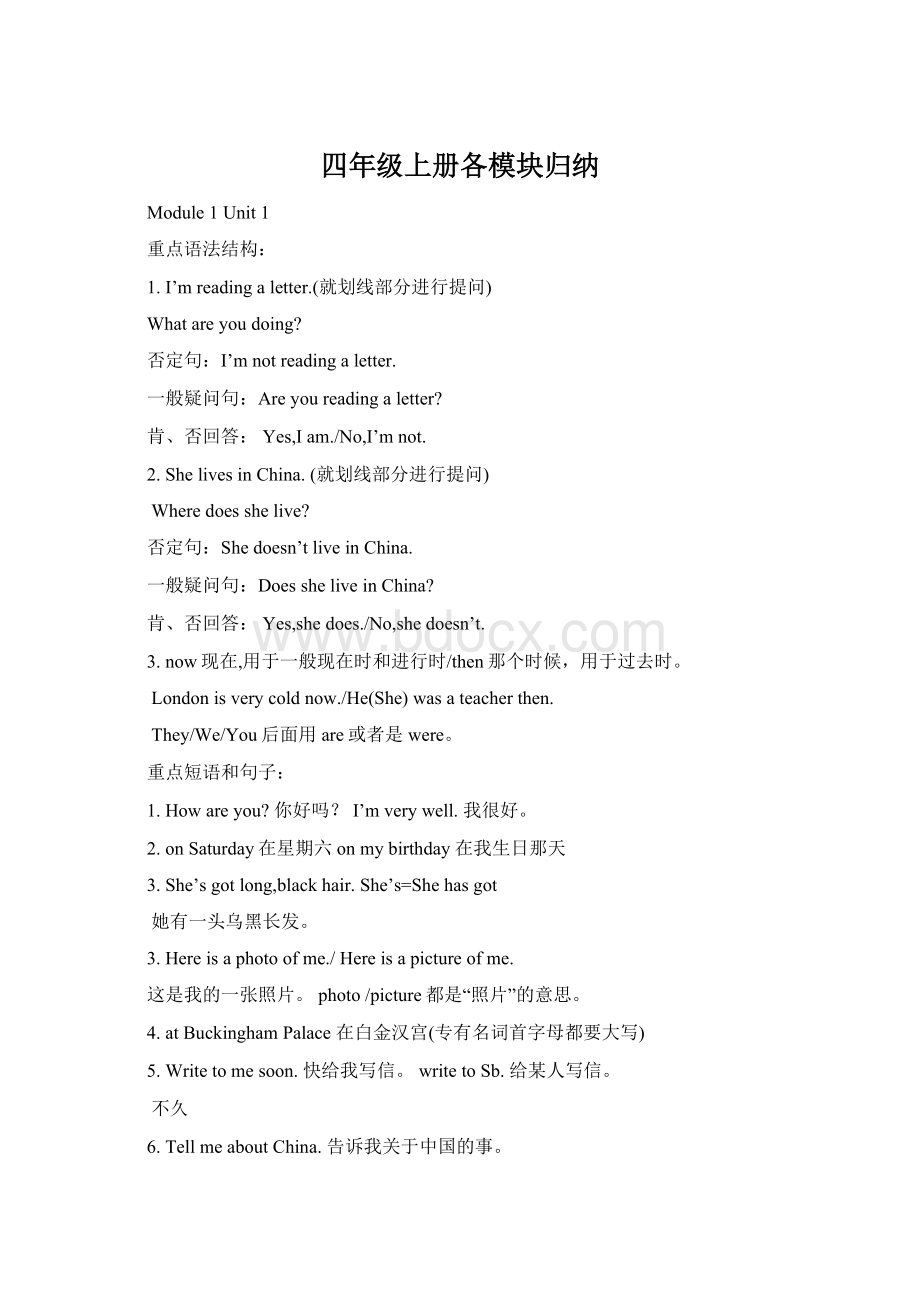四年级上册各模块归纳Word文档下载推荐.docx
《四年级上册各模块归纳Word文档下载推荐.docx》由会员分享,可在线阅读,更多相关《四年级上册各模块归纳Word文档下载推荐.docx(18页珍藏版)》请在冰豆网上搜索。

6.TellmeaboutChina.告诉我关于中国的事。
英国的名胜:
theLondonEye伦敦眼BigBen大本钟
theRiverThames泰晤士河TowerBridge塔桥
Module1Unit2
第三人称单数动词+s的变化规则:
1.一般情况下,直接加-s,如:
cook-cooks,make-makes
2.以s.x.sh.ch.o结尾,加-es,如:
finish-finishes,wash-washes,
watch-watches,go-goes,do-does,fix-fixes,miss-misses
3.以“元音字母+y”结尾,直接加-s,如:
play-plays,stay-stays
以“辅音字母+y”结尾,变y为i,再加-es,如:
study-studies
4.have----has
1.Thankyou(Thanks)foryourletter.感谢你的来信。
Thankyou(Thanks)foryourhelp.感谢你的帮助。
2.Heisstilleight.HewillbenineinApril.
仍然四月
他仍然是八岁,在四月份他将要九岁。
3.TheweatherinDaqingisn’thot.It’scold.
天气
大庆的天气不是很热,天很冷。
4.I’vegotanewfriend.我有一个新朋友I’vegot=Ihavegot
5.befrom...=comefrom…从、、、来
I’mfromHongKong./HecomesfromCanada.
IcomefromHongKong./HeisfromCanada.
6.traditionalfoodandtraditionaldancing传统的食物和舞蹈
7.IalsolikewatchingTV.=IlikewatchingTV,too.我还喜欢看电视。
a.also通常放在句子中间,而too则放在句尾。
b.like/love+doingSth.=like/love+todoSth.
表示喜欢/喜爱做某事
8.weartraditionalIndianclothes穿传统的印度服装
9.Myfavouritefoodishamburgers.我最喜欢的食物是汉堡包。
重点的国家名称:
China中国------Chinese中国人,中国人的,语文,汉语
Japan日本------Japanese日本人,日本人的,日语
England英国------English英国人,英国人的,英语
America美国------American意思和上面类似
Canada加拿大----Canadian意思和上面类似
Australia澳大利亚---Australian意思和上面类似
Russia俄罗斯-----Russian意思和上面类似
Mexico墨西哥----Mexican意思和上面类似
India印度-------Indian意思和上面类似
Module2Unit1
一般过去时
1.概念:
过去某个时间里发生的动作或状态;
过去习惯性、经常性的动作、行为;
2.时间状语(信号词):
ago(以前),yesterday(昨天),thedaybeforeyesterday(前天),lastweek(上周),last(year,night,month…),justnow(刚才),
oneday(有一天),onSunday
longlongago(很久很久以前),onceuponatime(从前)
3.基本结构:
(1)be动词。
否定形式:
was/were+not;
一般疑问句:
was或were放于句首
例子:
肯定句:
Hewasastudentbefore.他以前是一个老师。
Hewasn’t(wasnot)astudentbefore.
Washeastudentbefore?
肯定回答:
Yes,hewas./否定回答:
No,hewasn’t.
(2)行为动词的过去式。
否定形式:
在行为动词前加didn'
t,同时还原行为动词。
一般疑问句:
用助动词do的过去式did提问,同时还原行为动词。
例子
(1):
IwatchedTVlastnight.昨天我看电视了。
Ididn’twatchTVlastnight.
DidyouwatchTVlastnight?
Yes,Idid./否定回答:
No,Ididn’t.
就划线部分提问:
Whatdidyoudolastnight?
动词短语部分用do代替。
切记:
一定要还原动词原形,这是最好出错的。
例子
(2):
Shedidherhomeworkfivehoursago.5个小时前她做作
业了。
Shedidn’t(didnot)doherhomeworkfivehoursago.
Didshedoherhomeworkfivehoursago?
Yes,shedid./否定回答:
No,shedidn’t.
Whatdidshedolastnight?
不要把助动词did和do的过去式did混淆。
变否定句、一般疑问句时和特殊疑问句时,别忘了把did变成do。
4.动词过去式规则变化:
(1)直接加ed:
work----worked
(2)以不发音的e结尾的,+d:
live-----lived
(3)以辅音字母+y结尾的,变y为i加ed:
study------studied
(4)以重读闭音节结尾的,双写最后的辅音字母+ed:
stop---stopped
不规则变化:
例如:
go----wenteat----atesee----sawdrink----drank
send----sentwrite----wrotehave----had
get----gotfind----foundsleep----slept
buy----boughtdo----didcatch----caughtteach---taught
5.一般过去时口诀:
一般过去时并不难,表示过去动作、状态记心间。
动词要用过去式,时间状语句末站。
否定句很简单,didn'
t站在动词原形前,其它部分不要变。
一般疑问句也好变,did放在句子前,主语、动词原形、其它部分依次站。
特殊疑问句也简单,疑问词加一般疑问句记心间。
最后一条请注意,动词过去式要牢记。
重点句子:
1.Icleanedmyroom.我打扫了我的房间。
2.Ifinishedmyhomework.我完成了我的作业。
3.Iwashedmytrousers.我洗完了我的裤子。
4.Theywereverydirty.他们很脏。
/Mumwasveryhappy.妈妈很高兴。
请把这些句子按照上面我总结的变成各种句式,肯定句、否定句等等。
以便熟能生巧。
Module2Unit2
1.Hecookednoodles.他做面条了。
2.Shephonedgrandma.她给奶奶打电话了。
3.Theypaintedsomepictures.他们画了一些画。
4.Heplayedtheflute.他吹笛子了。
5.Shelistenedtomusic.她听音乐了。
6.Hehelpedhismother.他帮助了他的妈妈。
不会的马上问老师,千万不要积攒。
Module3Unit1
重点短语:
1.getup起床2.athalfpastsix在六点半
3.onMondays在每个星期一4.walktoschool步行上学
5.learnEnglish/studyEnglish学习英语
6.learnthesethings学习这些东西
7.NationalDay国庆节8.playwithhertoys玩她的玩具
重点句式:
例子
(1):
LinglingusuallygetsupattenonSaturdays.
玲玲在每个周六通常十点起床。
Linglingdoesn’tusuallygetupattenonSaturdays.
DoesLinglingusuallygetupattenonSaturdays?
Yes,shedoes./否定回答:
No,shedoesn’t.
WhattimedoesLinglingusuallygetuponSaturdays?
注意:
1.有助动词does时,后面动词用原形。
2.就点钟时间进行提问时,要用Whattime…?
3.一般现在时信号词最常见的有:
always(总是)/usually(通常)/often(经常)/sometimes(有时候)/seldom(很少)/never(从来没有)/every…(每…)everyday每天everyweek每周everyyear每年/onTuesdays
在每个星期二(请牢记这些词!
)
ShewatchedTVlastFriday.上周五她看电视了。
Shedidn’t(didnot)watchTVlastFriday.
DidshewatchTVlastFriday?
WhendidshewatchTV?
就具体时间进行提问时,用When…?
Module3Unit2
1.playfootball踢足球2.inthepark在公园里
3.ridemybike骑我的自行车4.stayathome呆在家里
5.makethebed整理床铺(13页游戏中的)
6.walktothepark步行去公园(12页歌曲中的)
7.talkonthephone在电话里聊天(12页歌曲中的)
8.ride的过去式是rode
Ioftenplaythedrumsinthepark.我经常在公园里打鼓。
Idon’toftenplaythedrumsinthepark.
Doyouoftenplaythedrumsinthepark?
Yes,Ido./否定回答:
No,Idon’t.
Wheredoyouoftenplaythedrums?
第一人称作主语引导的句子在变一般疑问句和特殊提问句时,要把第一人称变为第二人称,并注意标点变成问号。
Irodemybiketoschoolyesterday.我昨天骑自行车上学。
Ididn’tridemybiketoschoolyesterday.
Didyourideyourbiketoschoolyesterday?
Whatdidyoudoyesterday?
不仅要把I变成you,还要把my变成your
重点知识:
1.一般过去时的时间状语(信号词):
ago(以前),yesterday(昨天),thedaybeforeyesterday(前天),
lastweek(上周),last(year,night,month…),justnow(刚才),
oneday(有一天),onSunday,onceuponatime(从前),then
2.不规则变化:
send----sentwrite----wroteget----gotfind----foundsleep----sleptbuy----boughtdo----didcatch----caughtteach---taughtgo------wentsee-------saweat-------ate
fall----felldrink----drankgive----gaveput----put
have------hadbuy------boughtwear-----wore
run-----ranhurt-----hurttake-----took
make-----madelearn----learned/learnt
sing-----sangswim-----swamsay----said
break----brokecome------camefeel----felt
3.bebored无聊的,没意思的I’mverybored.我很无聊。
beangry生气的。
I’mveryangry.我很生气。
4.lookafter=takecareof照顾,看管,照料
Ilookedaftermysisterlastnight.昨天晚上我照顾我妹妹了。
Itookcareofmysisterlastnight.
5.Theboyrantothevillage.这个男孩跑去了村庄。
6.Everyonerantothefield.每个人都跑去了田地。
7.Awolfcametothefield.一只狼来到了田地。
8.thenextday第二天
9.tellalie/telllies撒谎Don’ttelllies.不要撒谎。
10.行为动词的过去式。
Theboyrantothevillagelastnight.
Theboydidn’truntothevillagelastnight.
Didtheboyruntothevillagelastnight?
Yes,hedid./否定回答:
No,hedidn’t.
Whatdidtheboydolastnight?
切记:
1.gointoashop走进一家商店
2.cheese不可数名词Whomovedmycheese?
3.bescared害怕的Heisveryscared.他很害怕。
4.Tillybrokethedoorandranaway.Tilly夺门而逃。
5.strike罢工;
打,打击;
敲,敲击
strike过去时struck
6.runup爬上rundown爬下
LessonThree
1.during(在…期间)theclassbreak在课间
2.havetwoChineseclasses上两节语文课
haveanEnglishclass上一节英语课
3.gainnewknowledge获得新知识
4.thisafternoon今天下午classmate同班同学
5.Theteachertaughtushowtoplaysoccer.
老师教我们如何玩足球。
6.playtabletennis=playping-pong打乒乓球
skiprope跳绳
7.gohome回家atfouro’clock在四点
8.Theschoolisover.放学Theclassisover.下课
Module4Unit1
中国古代四大发明:
1.造纸术:
paper2.印刷术:
printing
3.火药:
gunpowder4.指南针:
compass
重点单词、短语和句子:
1.inventv.发明inventionn.发明
2.printv.打印printingn.印刷术
3.clever聪明的4.like喜欢,像…
5.That’sright.那是正确的。
/That’sallright.没关系。
6.importantthings重要的东西/重要的事情
7.readnewspapers看报纸
Module4Unit2
1.lookat…看…Lookatthispicture.看这幅图。
2.bicycle/bike自行车3.aChinese一个中国人
4.anEnglish一个英国人5.ineighteenthirty-nine在1839年
6.intwothousand(千)andeight在2008年
intwothousand(千)andten在2010年
7.Whatagoodidea!
多么好的注意啊!
(感叹句)
8.Onewheel(轮子、轱辘)ofthisbicyclewasverysmall.
Thetwowheelsofthisbicyclewereverybig.
(注意单复数之分。
)
9.That’strue.那是真的。
Thatisn’ttrue.那不是真的。
第四模块的重点句式依然是一般过去时,要牢记这些基础知识。
Module5Unit1
重点短语、词汇和句子:
1.schooltrip校游2.gototheGreatWall去长城
3.climbtothe___top___爬到顶端
(顶端,尖)
4.lotsofmountains=alotofmountains许多大山。
5.eatbiscuits吃饼干
6.It’sapictureoftheGreatWall.这是一张长城的照片。
7.haveagoodtime=enjoyoneself(某人自己)玩的开心,过的愉快。
例子:
1.Hehadagoodtimelastnight.
2.Heenjoyedhimself.
8.buySb.Sth.=buySth.forSb.给某人买某物。
Iboughtyouabook.=Iboughtabookforyou.
Module5Unit2
1.goonaschooltrip去校游(参加学校组织的郊游)
goonapicnic去野餐
goice-skating去滑冰goswimming去游泳goshopping去购物
go后面跟的动词构成短语时通常加ing
2.trousers裤子3.Iworewarmclothes.我穿了暖和的衣服。
4.Ifellover.我摔倒了。
5.Ilearnttoskate.我学了滑冰。
6.Itdidn’t___hurt.___没有受伤。
受伤、伤害
Ididn’t___fall___overagain.我没有再次摔倒。
摔倒、落下
7.Itwaseasy.它很简单。
Itwas___really__fun.它真的很有趣。
真正地
Theicewasverycold.冰上很冷。
8.havealovelyday度过了快乐的一天。
9.Weclimbedupth